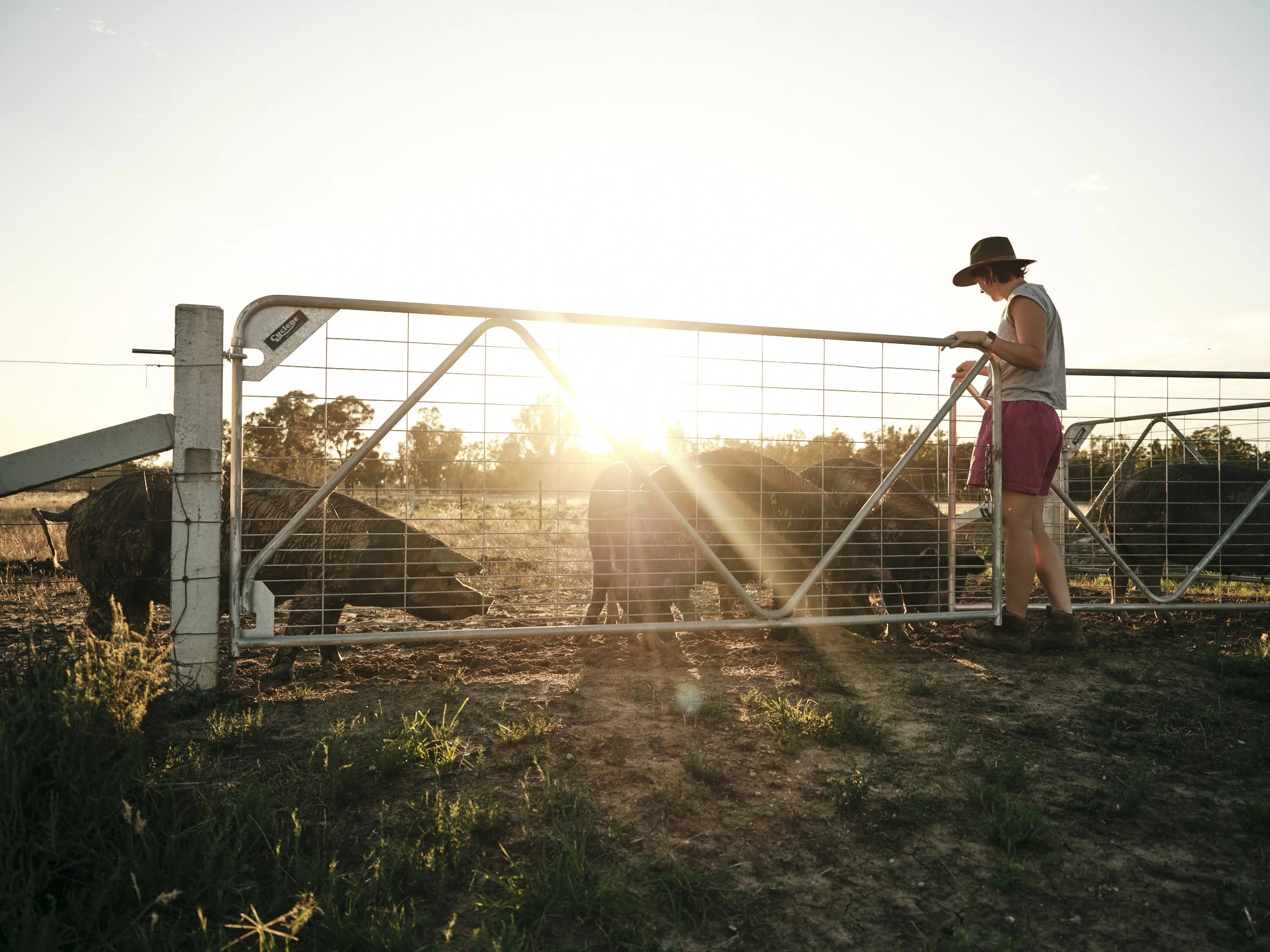Farming for Good: Lauren Steven’s mission to normalise regenerative farming
Paddock to plate is a driving thesis for Lauren Stevens’ Bundarra Farm, built on an idea of slow, regenerative farming. This means controlling the process from start to finish to make sure every decision is thoughtful and outcome‑driven.
— Lauren on her farm, Barapa Barapa Country, Barham, NSW
A life shaped by place
Just across Australia’s great Murray River near Barham, on Barapa Barapa Country crossing Northern Victoria and Southern, NSW, sits Bundarra Farm — 200 acres of red soil and big sky where animals roam, forage, and live as they were meant to. Since 2010, founder Lauren Stevens has grown Bundarra from a simple vision — a field of happy, truly free‑range pigs — into a paddock‑to‑plate enterprise that feeds chefs, families and a loyal local community with heritage Berkshire pork, farmhouse charcuterie, and, later, pastured chickens.
Place is not a backdrop here; it’s an active partner. The farm’s rhythms through rest, rotation, multi‑species cover, and careful timing work with the landscape, not against it. Every decision starts with the soil, and its long term health and productivity.
Practice: what they do and What it means
Bundarra’s approach is slow, regenerative, and transparent. The Stevens family don’t ever apply synthetic fertilisers or other chemical interventions. Instead, they focus on building soil carbon and biodiversity through animal rotations rest periods, and strategies that feed the soil microbiome, improve water infiltration, and reduce erosion.
Why Berkshire? The heritage breed (also known as Kurobuta) thrives outdoors with excellent temperament, strong mothering traits and natural marbling that translates to flavour and tenderness. Bundarra raises around 80 sows in genuine free‑range paddocks — low‑stress, pasture‑based environments with wallows, shade and forage — and steers clear of routine antibiotics or hormone treatments. The ethos is simple: welfare drives quality; quality drives flavour.
In 2013, Lauren launched an on‑farm butchery and store, turning Bundarra into a nose‑to‑tail operation where cuts and smallgoods could be crafted with care and full traceability. As demand built, Bundarra & Co Butchery opened in Barham in 2020 — a community shopfront for ethically produced meats and smallgoods where provenance isn’t a marketing line; it’s the operating system.
Today, the farm also hosts a flock of pastured chickens, by local breeder Adrian blending the genetics of Aussie game, Light Sussex, Plymouth Rock and Australian Bresse. The result? A highly flavoursome darker meat chicken, with yellow fat that cooks in a totaly unique way, and thrives in local conditions. While delicious, the chickens also add an important layer to the thoughtful production of the farm.
What even is regenerative farming?
Regenerative farming has become term encompassing a lot of different practices depending on who you ask and where they farm. But overall, the principle means farming that leaves the land in a better condition then when you started.
No‑till and cover cropping: Protects soil structure, keeps living roots in the ground, feeds soil microbes, boosts water holding capacity.
Rotational resting: Paddocks are rested to allow groundcover recovery and break parasite cycles naturally.
Diversity first: Multispecies plantings improve resilience, reduce pest pressure, and cycle nutrients without synthetic inputs.
Animal impact, managed: Pigs aerate and fertilise soil; careful timing prevents compaction and protects pasture.
Whole‑animal use: Nose‑to‑tail butchery reduces waste and maximises value per animal, supporting farm viability.
Sources: Farming for Good
Industry Building for the Long Term
Bundarra’s story is inseparable from its neighbours. The butchery created local jobs and a hub for skills — breaking down carcasses, curing, fermenting, and the craft of smallgoods. The shop became a place where the conversation about food integrity is everyday, not exceptional. Lauren’s insistence on fair pricing and direct relationships set a tone: dignity in work, pride in craft, and transparency as a norm.
As part of the Murray Plains Meat Cooperative, Lauren and fellow producers organised something many said couldn’t be done: a farmer‑owned micro‑abattoir serving the region. Opened in 2024, it secures ethical, local processing for small regenerative farms — reducing transport stress for animals, keeping value in the community, and putting control back in the hands of producers.
Sources: Murray Plains Meat
Systems and regeneration: programs, ecology, market
Bundarra’s model rethinks risk and reward across the chain:
On‑farm processing and a local shopfront shrink miles, lower energy use, and keep dollars circulating locally.
Compostable packaging and renewable energy choices push impact down the footprint curve.
A direct‑to‑consumer subscription model smooths demand, improves forecasting, and supports whole‑carcass utilisation.
Chef partnerships turn provenance into plate value — not as buzzwords, but as flavour, texture, and consistency chefs can plan around.
When micro‑abattoirs exist for smallholders, everything downstream gets better: animal welfare, meat quality, carbon intensity per kilogram (less haulage, less refrigeration time), and producer viability. That’s the systems shift Lauren is helping to normalise — regenerative not as a niche, but as the baseline.
Sources: Straight To The Source, Farming for Good
Chef advocacy and the plate connection
Slow‑grown Berkshire pork behaves differently in the pan: clean fat that renders beautifully, fine muscle fibres that hold moisture, and a sweetness that comes from time, pasture, and low stress. In the hands of chefs, that’s not marketing — it’s repeatable flavour. Charcuterie made nose‑to‑tail brings depth and range to menus, while pastured chicken adds a second regenerative protein pathway with its own flavour story.
Put simply: better care upstream means simplicity in the kitchen.
Background read: SMH — “A curly tale with Bundarra Berkshires”
Key Stats
Founded: 2010, Barap Barapa Country near Barham (Southern NSW/Northern Victoria)
Scale: ~200 acres; ~80 sows; genuine free‑range Berkshire system
Milestones: On‑farm butchery (2013); Bundarra & Co Butchery, Barham (2020); Murray Plains Meat farmer‑owned micro‑abattoir (2024)
Practices: Regenerative, no‑till, no synthetic fertilisers/herbicides, multispecies covers, whole‑animal utilisation, local processing
Product: Heritage Berkshire pork, farmhouse charcuterie; pastured heritage cross chickens
Sources: Farming for Good • Murray Plains Meat • Straight To The Source • SMH






